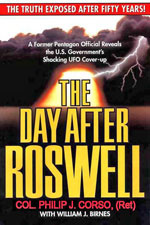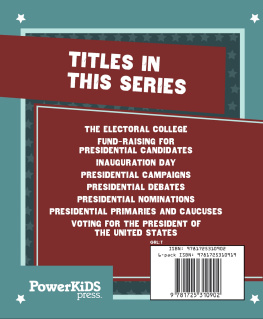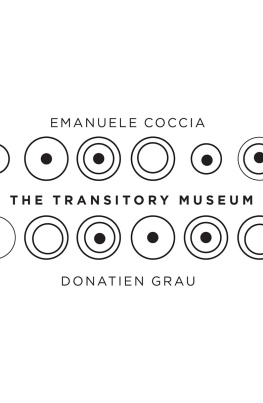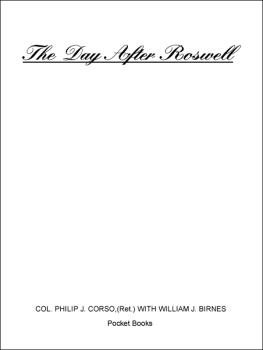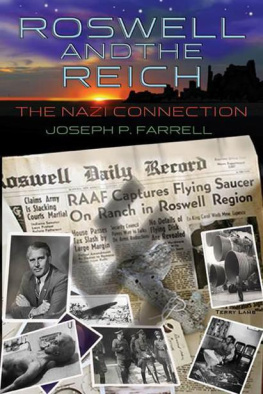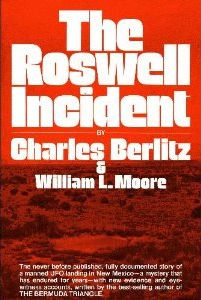Philip J. Corso - The Day After Roswell
Here you can read online Philip J. Corso - The Day After Roswell full text of the book (entire story) in english for free. Download pdf and epub, get meaning, cover and reviews about this ebook. year: 0, genre: Art. Description of the work, (preface) as well as reviews are available. Best literature library LitArk.com created for fans of good reading and offers a wide selection of genres:
Romance novel
Science fiction
Adventure
Detective
Science
History
Home and family
Prose
Art
Politics
Computer
Non-fiction
Religion
Business
Children
Humor
Choose a favorite category and find really read worthwhile books. Enjoy immersion in the world of imagination, feel the emotions of the characters or learn something new for yourself, make an fascinating discovery.
- Book:The Day After Roswell
- Author:
- Genre:
- Year:0
- Rating:3 / 5
- Favourites:Add to favourites
- Your mark:
- 60
- 1
- 2
- 3
- 4
- 5
The Day After Roswell: summary, description and annotation
We offer to read an annotation, description, summary or preface (depends on what the author of the book "The Day After Roswell" wrote himself). If you haven't found the necessary information about the book — write in the comments, we will try to find it.
The Day After Roswell — read online for free the complete book (whole text) full work
Below is the text of the book, divided by pages. System saving the place of the last page read, allows you to conveniently read the book "The Day After Roswell" online for free, without having to search again every time where you left off. Put a bookmark, and you can go to the page where you finished reading at any time.
Font size:
Interval:
Bookmark:
Forward
Senator Strom Thurmond
When I was first elected to the United States Senate in 1954, the United States and democratic Western governments were locked in a bitter, and sometimes deadly, Cold War with totalitarian Communist governments that sought to expand their bankrupt-ideology throughout the world. Though those who did not live during this era have a hard time picturing it, the 1950s and 1960s were a period in our history when there was a very real need to be concerned about a Communist, especially Soviet, threat to our security and institutions.
As a member of the Senate Armed Services Committee, I took a lead role in seeking out those in our government who sought to muzzle military personnel who wanted to alert Americans to the threats we faced from our Communist enemies and to speak out against some of the plainly misguided, incorrect and, frankly, dangerous policies of the United States in dealing with the Soviets and Red Chinese. Distinguished officers and patriotic men such as Admiral Arleigh Burke and General Arthur Trudeau were essentially censored by their own government because of the views they espoused about the state of the world and the nature of the threat before our nation. As a veteran of World War II, a commissioned officer in the United States Army Reserve, and a proponent of a strong and comprehensive military, I could not sit idly by and watch our military be undermined by people in government who were sympathetic to Communism.
During this period, the Armed Services Committee held extensive hearings into this matter. It seemed an alien concept that in a nation that protects and cherishes free expression, the men who risked their lives to keep us free and best understood how we should confront our enemies would be ordered silent. It was under these circumstances that I came to know Philip Corso, then a colonel in the United States Army, who was equally disturbed about the muzzling of our military, and who shared my concern about the future of our military forces.
As the members of the Armed Services Committee worked diligently to discover who was working to quiet our soldiers, sailors, marines, and airmen, Colonel Corso was brought to my attention by two of my former staff members. The colonel had a great deal of credibility and expertise not only as a military officer but also in the fields of intelligence and national security. A veteran of World War II and Korea, Corso had also spent four years working at the National Security Council. In short, he was very familiar with issues that concerned me and my colleagues on the Senate Armed Services Committee, and he very quickly became a valued source of bountiful information that was insightful and, most important, accurate. As a matter of fact, the material he provided was invaluable in helping us prove that the stifling of American military officers was being ordered by individuals in high ranking positions within our own government.
In 1963, when I learned of Colonel Corsos impending retirement from the army, I thought that having a man with his background and experiences on my staff would be of great benefit. So after offering him a position that promised nothing more than long hours of hard work at a modest salary, Philip Corso once again willingly went to work serving and protecting the United States, this time as an aide in my office.
There is no question that Philip Corso has led a full and adventurous life, and I am certain that he has many interesting stories to share with individuals interested in military history, espionage, and the workings of our government. We should all be grateful that there are men and women like Colonel Corso - people who are willing to dedicate their lives to serving the nation and protecting the ideals we all hold dear - and we should honor the sacrifices they have made in their careers and in their lives.
INTRODUCTION
My name is Philip J. Corso, and for two incredible years back in the 1960s while I was a lieutenant colonel in the army heading up the Foreign Technology desk in Army Research and Development at the Pentagon, I led a double life. In my routine everyday job as a researcher and evaluator of weapons systems for the army, I investigated things like the helicopter armament the French military had developed, the tactical deployment complexities of a theater antimissile missile, or new technologies to preserve and prepare meals for our troops in the field.
I read technology reports and met with engineers at army proving grounds about different kinds of ordnance and how ongoing budgeted development projects were moving forward. I submitted their reports to my boss, Lt. Gen. Arthur Trudeau, the director of Army R&D and the manager of a three thousand plus man operation with lots of projects at different stages. On the surface, especially to congressmen exercising oversight as to how the taxpayers money was being spent, all of it was routine stuff.
Part of my job responsibility in Army R&D (research and development), however, was as an intelligence officer and adviser to General Trudeau who, himself, had headed up Army Intelligence before coming to R&D. This was a job I was trained for and held during World War II and Korea. At the Pentagon I was working in some of the most secret areas of military intelligence, reviewing heavily classified information on behalf of General Trudeau. I had been on General Mac Arthurs staff in Korea and knew that as late as 1961 - even as late, maybe, as today - as Americans back then were sitting down to watch Dr. Kildare or Gunsmoke, captured American soldiers from World War II and Korea were still living in gulag conditions in prison camps in the Soviet Union and Korea. Some of them were undergoing what amounted to sheer psychological torture. They were the men who never returned.
As an intelligence officer I also knew the terrible secret that some of our governments most revered institutions had been penetrated by the KGB and that key aspects of American foreign policy were being dictated from inside the Kremlin. I testified to this first at a Senate subcommittee hearing chaired by Senator Everett Dirksen of Illinois in April 1962, and a month later delivered the same information to Attorney General Robert Kennedy. He promised me that he would deliver it to his brother, the President, and I have every reason to believe he did. It was ironic that in 1964, after I retired from the army and had served on Senator Strom Thurmond s staff, I worked for Warren Commission member Senator Richard Russell as an investigator.
But hidden beneath everything I did, at the center of a double life I led that no one knew about, and buried deep inside my job at the Pentagon was a single file cabinet that I had inherited because of my intelligence background. That file held the armys deepest and most closely guarded secret: the Roswell files, the cache of debris and information an army retrieval team from the 509th Army Air Field pulled out of the wreckage of a flying disk that had crashed outside the town of Roswell in the New Mexico desert in the early morning darkness during the first week of July 1947.
The Roswell file was the legacy of what happened in the hours and days after the crash when the official government cover-up was put into place. As the military tried to figure out what it was that had crashed, where it had come from, and what its inhabitants intentions were, a covert group was assembled under the leadership of the director of intelligence, Adm. Roscoe Hillenkoetter, to investigate the nature of the flying disks and collect all information about encounters with these phenomena while, at the same time, publicly and officially discounting the existence of all flying saucers. This operation has been going on, in one form or another, for fifty years amidst complete secrecy.
Font size:
Interval:
Bookmark:
Similar books «The Day After Roswell»
Look at similar books to The Day After Roswell. We have selected literature similar in name and meaning in the hope of providing readers with more options to find new, interesting, not yet read works.
Discussion, reviews of the book The Day After Roswell and just readers' own opinions. Leave your comments, write what you think about the work, its meaning or the main characters. Specify what exactly you liked and what you didn't like, and why you think so.

